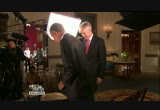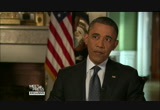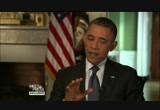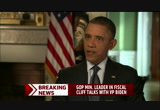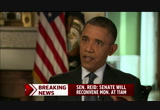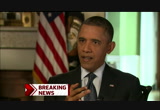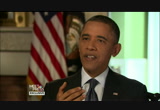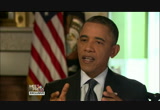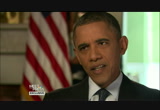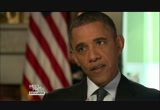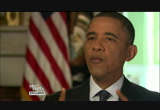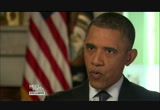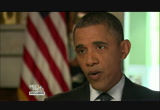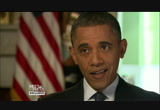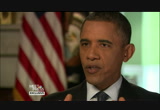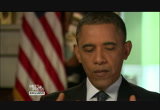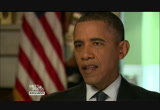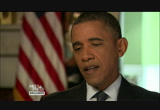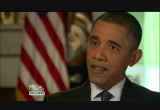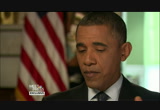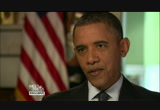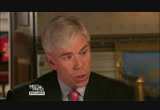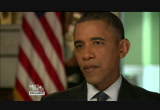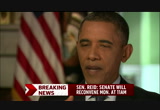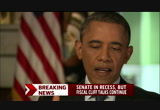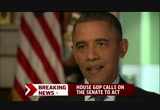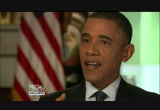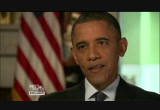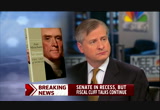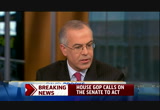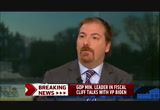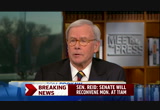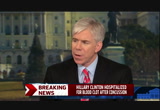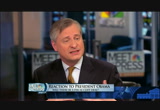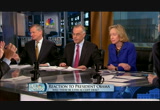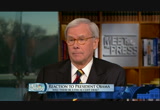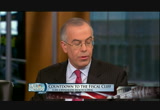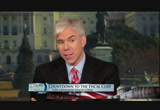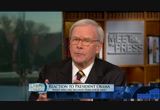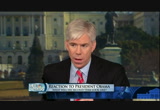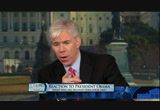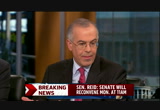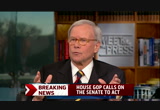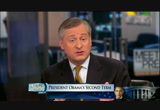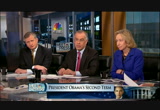tv Sex Slaves - Chicago MSNBC December 30, 2012 6:00pm-7:00pm PST
6:01 pm
from nbc news in knew from nbc news in washington, the world's longest running television program, this is "meet the press" with david gregory. >> good sunday morning. time nearly up before we go over the fiscal cliff. senate leaders spent the weekend working on a last-ditch deal and the house comes back for a rare sunday session. president obama sat down with me in the blue room of the white house to discuss the way forward and his priorities for a second term. mr. president, welcome back to "meet the press." >> great to be here. thank you. >> the obvious question, are we going to go over the fiscal cliff? >> well, i think we'll find out in the next 48
6:02 pm
hours what congress will decide to do. but i think it's important for the american people to understand exactly what this fiscal cliff is, because it's actually not that complicated. the tax cuts that were introduced in 2001, 2003, 2010, those were extended, and they are all about to expire at the end of the year. so on midnight, december 31st, if congress doesn't act, then everybody's taxes go up. and for the average family, that could mean a loss of $2,000 in income. for the entire economy, that means consumers have a lot less money to make purchases, which means businesses are going to have a lot less customers, which means that they are less likely to hire, and the whole economy could slow down at a time when the economy is actually starting to pick up. we are seeing signs of recovery in housing and in employment numbers improving. and so what congress needs to do, first and foremost, is to prevent taxes from going up for the vast majority of americans. and this was a major topic of
6:03 pm
discussion throughout the campaign. what i said was that we should keep taxes where they are for 98% of americans. 97% of small businesses. but if we're serious about deficit reduction, we should make sure that the wealthier are paying a little bit more and combine that with spending cuts to reduce the deficit and put our economy on a long-term trajectory of growth. you know, we have been talking to the republicans ever since the election was over. they have had trouble saying yes to a number of repeated offers. yesterday i had another meeting with the leadership, and i suggested to them if they can't do a comprehensive package of smart deficit reduction, let's at minimum make sure that people's taxes don't go up and that 2 million people don't lose their unemployment insurance. and i was modestly optimistic yesterday. but we don't yet see an agreement, and now the pressure is on congress to produce. if they don't, what i've said is that in the senate, we should go
6:04 pm
ahead and introduce legislation that would make sure middle class taxes stay where they are, and there should be an up or down vote. everybody should have a right to vote on that. you know, if republicans don't like it, they can vote no. but i actually think that there's a majority of support for making sure that middle class families are held harmless. >> if you go over the cliff, what's the impact on the markets? they have been pretty confident up until now that a deal would get done. >> it's hard to speculate on the markets. but obviously i think business and investors are going to feel more negative about the economy next year. if you look at projections of 2013, people generally felt that the economy would continue to grow. unemployment would continue to tick down. housing would continue to improve. but what's been holding us back is the dysfunction here in washington. and if, you know, people start seeing that on january 1, this problem still hasn't been solved, that we haven't seen the kind of deficit reduction that we could have had had the
6:05 pm
republicans been willing to take the deal that i gave them, if they say that people's taxes have gone up, which means consumer spending is going to be depressed, then obviously that's going to have an adverse reaction on the markets. >> what about spending cuts? those take place january 1 as well. do they have to be part of the deal? you have half of those cuts in defense alone. >> well, the other part of the fiscal cliff is congress agreed that they would cut an additional $1.2 trillion in spending. they put a committee together to try to come up with those numbers. they didn't figure out how to do it. and so what we now have is a situation where these automatic spending cuts go into place. now if we have raised some revenue by the wealthy paying a little bit more, that would be sufficient to turn off what's called the sequester, these automatic spending cuts. and that also would have a better outcome for our economy in long term.
6:06 pm
but, you know, so far at least, congress has not been able to get this stuff done, not because democrats in congress don't want to go ahead and cooperate, but because i think it's been very hard for speaker boehner and republican leader mcconnell to accept the fact that taxes on the wealthiest americans should go up a little bit as part of an overall deficit reduction package. >> when you talk about a dysfunction in washington, you signed this legislation setting up the fiscal cliff 17 months ago. how accountable are you for the fact that washington can't get anything done and that we are at this deadline again? >> well, i have to tell you, david, if you look at my track record over the last two years, i cut spending by over a trillion dollars in 2011. i campaigned on the promise of being willing to reduce the deficit in a serious way, in a balanced approach of spending cuts, and tax increases on the wealthy, while keeping middle class taxes low. i put forward a very specific proposal to do that.
6:07 pm
i negotiated with speaker boehner in good faith and moved more than halfway in order to achieve a grand bargain. i offered over $1 trillion in additional spending cuts so that we would have $2 of spending cuts for every $1 of increased revenue. i think everybody objectively who has looked at this would say that, you know, we have put forward not only a sensible deal but one that has the support of the majority of the american people, including close to half of republicans. >> when they say leadership falls on you, mr. president, you don't have a role here in breaking this impasse? you've had a tough go with congress. >> at a certain point if folks can't say yes to good offers, then i also have an obligation to the american people to make sure that the entire burden of deficit reduction doesn't fall on seniors who are relying on medicare. i also have an obligation to make sure that families who rely on medicaid to take care of a
6:08 pm
disabled child aren't carrying this burden entirely. i also have an obligation to middle class families to make sure that they're not paying higher taxes when millionaires and billionaires are not having to pay higher taxes. there is a basic fairness that is at stake in this whole thing that the american people understand and they listened to an entire year's debate about it. they made a clear decision about the approach they prefer, which is a balanced, responsible package. they rejected the notion that the economy grows best from the top down. they believe that the economy grows best from the middle class out. and, at a certain point, you know, it is very important for republicans in congress to be willing to say we understand we're not going to get 100%. we are willing to compromise in a serious way in order to solve problems as opposed to being worried about the next election. >> you said that republicans have a hard time saying yes, particularly to you.
6:09 pm
>> yes. >> what is it about you, mr. president, that you think is so hard to say yes to? >> that's something that you're probably going to have to ask them, because, david, you follow this stuff pretty carefully. the offers that i've made to them have been so fair that a lot of democrats get mad at me. i mean, i offered to make some significant changes to our entitlement programs in order to reduce the deficit. i offered not only $1 trillion -- over $1 trillion in spending cuts over the next 10 years, but these changes would result in even more savings in the next ten years. and would solve our deficit problem for a decade. they say that the biggest priority is making sure that we deal with the deficit in a serious way. but the way they're behaving is that their only priority is making sure that tax breaks for the wealthiest americans are protected. that seems to be their only
6:10 pm
overriding unifying theme. and, at some point, i think what's going to be important is that they listen to the american people. now, you know -- i think that over the next 48 hours, my hope is that the people recognize that, regardless of partisan differences, our top priority has to be to make sure that taxes on middle class families do not go up that would hurt our economy badly. we can get that done. democrats and republicans both say they don't want taxes to go up on middle class families. that's something we all agree on. if we can get that done, that takes a big bite out of the fiscal cliff. it avoids the worst outcomes. and we're then going to have some tough negotiations in terms of how we continue to reduce the deficit, grow the economy, create jobs. >> if this fight comes back. i want to ask you specifically about entitlements, medicare and social security. are you prepared in the first year of your second term to
6:11 pm
significantly reform those two programs, to go beyond the cuts you've suggested to benefits in medicare that your own debt commission suggested you have to do if you are really going to shore up medicare at least? are you prepared to do that in your first year of the second term? >> what i've said is i am prepared to do everything i can to make sure that medicare and social security are there, not just for this generation but for future generations. >> you've got to talk tough to seniors, don't you? >> i already have. david, as you know, one of the proposals we made was something called chained cpi, which sounds technical, but basically is an adjustment in terms of how inflation is calculated on social security, highly unpopular among democrats, not something supported by aarp. but in pursuit of strengthening social security for the long term, i am willing to make those decisions. what i'm not willing to do is to have the entire burden of deficit reduction rest on the shoulders of seniors, making
6:12 pm
students pay higher student loan rates, ruining our capacity to invest in things like basic research that help our economy grow. those are the things i'm not willing to do. and so if you -- >> are you committed to that in the first year of your second term, telling congress we've got to get it done in the first year? >> david, i want to be very clear. you are not only going to cut your way to prosperity. one of the fallacies, i think, that has been promoted is this notion that deficit reduction is only a matter of cutting programs that are really important to seniors, students, and so forth. that has to be part of the mix. but what i ran on, and what the american people elected me to do, was to put forward a balanced approach, to make sure that there's shared sacrifice, that everybody is doing a little bit more. and it is very difficult for me to say to a senior citizen or a student or a mom with a disabled
6:13 pm
kid, you are going to have to do with less, but we're not going to ask millionaires and billionaires to do more. that's something that -- that's not an approach that the american people think is right. and by the way, historically that's not how we grow an economy. we grow an economy when folks in the middle, folks who are striving to get in the middle class, when they do well. >> i'm asking you about time frame because, as you well know, as a second-term president now, about to begin your second term, your political capital, even having won the election, is limited. so what is your single priority of your second term? what is the equivalent to health care? >> there's a couple of things we need to get done. i have said that fixing our broken immigration system is a top priority. i will introduce legislation in the first year to get that done. i think we have talked about it long enough. we know how we can fix it. we can do it in a comprehensive way that the american people support. that's something we should get done. the second thing that we've got to do is to stabilize the economy and make sure it's growing. part of that is deficit reduction.
6:14 pm
part of it is also making sure that we're investing, for example, in rebuilding our infrastructure, which is broken. and, you know, if we are putting people back to work, rebuilding roads, bridges, schools, in part paying for it by some of these broader, long-term deficit reduction measures that need to take place, that will grow the economy at the same time as we're also setting our path for long-term fiscal stability. number three, you know, we've got a huge opportunity around energy. we are producing more energy, and america can become an energy exporter. how do we do that in a way that also deals with the environmental challenges we have at the same time? so that's going to be a third thing. but the most immediate thing i've got to do, starting on january 1, if congress doesn't act before the end of the year, is to make sure that taxes are not going up on middle class families. because it is going to be very hard for the economy to sustain its current growth trends if
6:15 pm
suddenly we have a huge bite taken out of the average american's paycheck. >> those are four huge things, and you didn't mention after newtown, although i know you're thinking about it, new gun regulation. >> yes. >> mayor bloomberg told me that ought to be your number one agenda. you know how hard this is. do you have the stomach for the political fight for new gun control laws? >> david, i think anybody who was up in newtown who talked to the parents, who talked to the families, understands that, you know, something fundamental in america has to change. and all of us have to do some soul searching, including me as president, that we allow a situation in which 20 precious small children are getting gunned down in a classroom. and i've been very clear that, you know, an assault rifle ban,
6:16 pm
banning these high capacity clips, background checks, that there are a set of issues that i have historically supported and will continue to support. >> but can you get it done? i mean the politics is the question. >> so the question is, are we going to be able to have a national conversation and move something through congress? i'd like to get it done in the first year. i will put forward a very specific proposal, based on the recommendations that joe biden's task force is putting together, as we speak. and so this is not something that i will be putting off. but -- >> the nra says it's not going to work. it didn't work before, it's not going to work now. >> my response is something has to work. it is not enough for us to say this is too hard so we're not going to try. so what i intend to do is i will call all the stakeholders together, i will meet with the republicans, i will meet with democrats, i will talk to anybody. i think there are a vast majority of responsible gun
6:17 pm
owners out there who recognize that we can't have a situation in which somebody with, you know, severe psychological problems is able to get the kind of high capacity weapons that this individual in newtown obtained and gun down our kids. and, yes, it's going to be hard. >> should we have an armed guard at every school in the country? that's what the nra believes. they told me last week that could work. >> you know, i'm not going to prejudge the recommendations that are given to me. i am skeptical that the only answer is putting more guns in schools. and i think the vast majority of the american people are skeptical that that somehow is going to solve our problem. and, look, here's the bottom line. we're not going to get this done unless the american people decide it's important. and so this is not going to be simply a matter of me spending political capital.
6:18 pm
one of the things that you learn, having now been in this office for four years is, you know, the old adage of abraham lincoln's, that with public opinion there's nothing you can't do. and without public opinion, there's very little you can get done in this town. so i'm going to be putting forward a package, and i'm going to be putting my full weight behind it. and i'm going to be making an argument to the american people about why this is important and why we have to do everything we can to make sure that something like what happened at sandy hook elementary does not happen again. but ultimately, the way this is going to happen is because the american people say that's right. we are willing to make different choices for the country, and we support those in congress who are willing to take those actions. and will there be resistance? absolutely there will be resistance. and the question then becomes, you know, whether we are actually shook up enough by what happened here that it does not just become another one of these routine episodes where it gets a lot of attention for a couple of
6:19 pm
weeks and then it drifts away. it certainly won't feel like that to me. this is something that -- you know, that was the worst day of my presidency. and it's not something that i want to see repeated. >> it hit close to home? >> absolutely. >> let me ask you about a couple of foreign policy notes. after the attack in benghazi, is there a need for more accountability so this doesn't happen again? and do you know who was behind the attack at this point? >> two points. number one, i think that tom pickering and mike mullen, who headed up the review board, did a very thorough job in identifying what were some severe problems in diplomatic security. and they provided us with a series of recommendations. many of them were already starting to be implemented. secretary clinton has indicated that she is going to implement all of them. what i've -- my message to the state department's been very simple.
6:20 pm
and that is, we're going to solve this. we're not going to be defensive about it. we're not going to pretend that this was not a problem. this was a huge problem. and we're going to implement every single recommendation that's been put forward. some individuals have been held accountable inside of the state department. and what i've said is that we are going to fix this to make sure that this does not happen again because these are folks that i send into the field. we understand that there are dangers involved. but, you know, when you read the report, and it confirms what we had already seen based on some of our internal reviews, there was just some sloppiness, not intentional, in terms of how we secure embassies in areas where you essentially don't have governments that have a lot of capacity to protect those embassies. so we're doing a thorough renew. not only will we implement all the recommendations that were made, but we'll try to do more than that. you know, with respect to who carried it out, that's an
6:21 pm
ongoing investigation. the fbi has sent individuals to libya repeatedly. we have some very good leads. but this is not something that i'm going to be at liberty to talk about right now. >> in the politics and the back and forth in this, do you feel like you let your friend susan rice out there to dry a little bit? >> no. first of all, i think i was very clear throughout that susan has been an outstanding u.n. ambassador for the united states. she appeared on a number of television shows reporting what she and we understood to be the best information at the time. this was a politically motivated attack on her. i mean, of all the people in my national security team, she probably had the least to do with anything that happened in benghazi. why she was targeted individually for this kind of
6:22 pm
attacks that she was subjected to is -- was puzzling to me, and i was very clear in the days after those attacks that they weren't acceptable. so, you know, the good thing is that i think she will continue to serve at the u.n. and do an outstanding job. and i think that most americans recognize that these were largely politically motivated attacks as opposed to being justified. >> you have another series of cabinet choices to make. former senator chuck hagel has come under criticism for comments he made including about a former ambassador nominee during the clinton years, that being gay was an inhibiting factor to being gay to do an effective job. is there anything about chuck hagel's record or statements that is disqualifying to you should you nominate him to run the defense department? >> well, first of all, i haven't made a decision about who to nominate. and my number one criteria will be who is going to do the best job in helping to secure america.
6:23 pm
>> do you think this disqualifies him? >> not that i see. i served with chuck hagel. i know him. he is a patriot. he has done extraordinary work both in the united states senate. somebody who served this country with valor in vietnam. and is somebody who is currently serving on my intelligence advisory board and doing an outstanding job. so i haven't made a decision on this. with respect to the particular comment that you quoted, he apologized for it. and i think it's a testimony to what has been a positive change over the last decade in terms of people's attitudes about gays and lesbians serving our country. and that's something that i'm very proud to have led, and i think that anybody who serves in my administration understands my attitude and position on those issues. >> mr. president, as you look forward to a second term, you think about your legacy. you think about your goals. how frustrated are you at how
6:24 pm
hard it appears to be to get some of these things done? very difficult relationship with congress. people come up to me all the time and say, don't they realize, all of them, the president, republicans and democrats, how frustrated we all are? >> well, i think we're all frustrated. you know, the only thing i would caution against, david, is i think this notion of, well, both sides are just kind of unwilling to cooperate. that's just not true. if you look at the facts, what you have is a situation here where the democratic party, warts and all, and certainly me, warts and all, have consistently done our best to try to put country first, and to try to work with everybody involved to make sure that we've got an economy that grows, make sure that it works for everybody, make sure that we're keeping the country safe. and, you know, the democratic party still have some knee-jerk ideological positions.
6:25 pm
and are there some folks in the democratic party who sometimes aren't reasonable? of course. that's true of every political party. but generally if you look at how i've tried to govern and how i'll continue to try to govern, i'm not driven by some ideological agenda. i'm a pretty practical guy. and i just want to make sure that things work. and one of the nice things about never having another election again, i will never campaign again, is that i think you can rest assured is that all i care about is making sure that i leave behind an america that is stronger, more prosperous, you know, more stable, more secure, than it was when i came into office. and that's going to continue to drive me. and i think that the issue that we're dealing with right now on the fiscal cliff is a prime example of it. what i'm arguing for are maintaining tax cuts for 98% of
6:26 pm
americans. you know, i don't think anybody would consider that some liberal left wing agenda. that used to be considered a pretty mainstream republican agenda. and it's something that we can accomplish today if we simply allow for a vote in the senate and in the house to get it done. the fact that it's not happening is an indication of, you know, how far certain factions inside the republican party have gone where they can't even accept what used to be considered centrist mainstream positions on these issues. now i remain optimistic. you know, i'm just a general optomist, that eventually people kind of see the light. you know, winston churchill used to say that we americans, you know, we try every other option before we finally do the right thing. after everything else is
6:27 pm
exhausted, we eventually do the right thing. and i think that that's true for congress as well. and i think it's also important for americans to remember that politics has always been messy. people have been asking me a lot about the film "lincoln." and, you know -- >> is this your lincoln moment? >> well, no. look, a, i never compare myself to lincoln. and, b, obviously the magnitude of the issues are quite different from the civil war and slavery. the point, though, is democracy has always been messy. we're a big, diverse country that is constantly sort of arguing about all kinds of stuff. but eventually, we do the right thing. and in this situation, i'm confident that one of two things are going to happen when it comes to the fiscal cliff. number one, we're going to see an agreement in the next 48 hours, in which case middle class taxes will not go up. if that doesn't happen, then democrats in the senate will put a bill on the floor of the senate, and republicans will
6:28 pm
have to decide if they are going to block it, which will mean that middle class taxes do go up. i don't think they would want to do that politically but they may end up doing it. and if all else fails, if republicans, in fact, do decide to block it so that taxes on middle class families do, in fact, go up on january 1, then we'll come back with a new congress on january 4, and the first bill that will be introduced on the floor will be to cut taxes on middle class families, and, you know, i don't think the average person is going to say, gosh, you know, that's a really partisan agenda on the part of either the president or democrats in congress. i think people will say, that makes sense because that's what the economy needs right now. so if one way or another we'll get through this. do i wish that things were more orderly in washington and rational and people listened to the best arguments and
6:29 pm
compromised and operated in a more thoughtful and organized fashion? absolutely. but when you look at history, that's been the exception rather than the norm. >> my interview with president obama. coming up, reaction to the interview. and what it tells us about what his second term will look like. joining me, nbc's tom brokaw. presidential historian doris kearns goodwin, executive editor at random house, jon meacham. david brook of "the new york times." and our political director and chief white house correspondent chuck todd. all coming up next. se correspondent, chuck todd, all
6:30 pm
there is no mass-produced human. so we created the extraordinarily comfortable sleep number experience. a collection of innovations designed around a bed with dualair technology that allows you to adjust to the support your body needs - each of your bodies. our sleep professionals will help you find your sleep number setting. exclusively at a sleep number store. comfort individualized. save 50% on the final closeout of our silver limited edition
6:32 pm
coming up, reaction from my roundtable. you heard the president lay out his big agenda items for his second term. immigration, the economy, energy, middle class tax cuts not to mention gun control. can he realistically get any of them done given washington's track record of dysfunction? the roundtable is here to break it all down after this brief commercial break. [ laughter ] smoke? nah, i'm good. ♪
6:33 pm
[ male announcer ] every time you say no to a cigarette, you celebrate a little win. nicoderm cq, the patch with time release smart control technology that acts fast and helps control cravings all day long. ♪ quit one day at a time with nicoderm cq. time for citi price rewind. because your daughter really wants that pink castle thing. and you really don't want to pay more than you have to. only citi price rewind automatically searches for the lowest price. and if it finds one, you get refunded the difference. just use your citi card and register your purchase online. have a super sparkly day! ok. [ male announcer ] now all you need is a magic carriage. citi price rewind. start saving at citi.com/pricerewind.
6:35 pm
when it comes to the fiscal cliff. number one, we're going to see an agreement in the next 48 hours, in which case middle class taxes will not go up. if that doesn't happen, then democrats in the senate will put a bill on the floor of the senate, and republicans will have to decide if they are going to block it, which will mean that middle class taxes do go up. i don't think they will want to do that politically, but they may end up doing it. >> that of course from our interview just moments ago with the president. i sat down with him yesterday at the white house. putting the onus squarely on congressional leaders to either do a comprehensive package now or a short-term solution to prevent middle class taxes from going up. joining me now, nbc news political director and chief white house correspondent chuck todd. nbc news special correspondent tom brokaw. author of "new york times" best telling book "thomas jefferson: the art of power" jon
6:36 pm
meacham. and presidential historian and author of the lincoln biography "team of rivals" doris kearns goodwin. my big take away, the president is setting the tone here, putting them on notice that yes, taxes are going to gun, and he's going to drive a hard bargain on a lot of different issues rather than try to bring them into the fold. he doesn't feel like compromise is going to work. >> let's just say that what is happening at the congress right now is pathetic. think of what the rev luths area generation, the world war ii generation did. we are asking not to bankrupt our children. we have a shambolic process. i think most of the blame still has to go to the republicans. they have had a brain freeze since the election. they have no strategy. they don't know what they want, and they haven't decided what they want. but if i had to fault president obama, i would say sometimes he has governed like a visitor from a morally superior civilization. he comes in here, and he will not -- he'll talk with boehner. he won't talk with the other republicans. he hasn't built their trust. boehner actually made a pretty serious concession, $800 billion in tax revenues. probably willing to go up on rates. but the trust wasn't there to get that done. if the president wants to get stuff done over the next four
6:37 pm
years, it's got to be a lot more than making the intellectual concessions. it's got to get to the place where republicans say, ok, we'll take a risk. this guy won't screw us. they don't feel that right now. >> chuck, just your reading of the immediate news that's going to be made over the course of today and tomorrow, again, what i think is significant, the president is saying we either get this deal now, or we'll go over the cliff. we'll come back right after the first of the year and try to get the tax cuts through again. but the republicans are going to be forced to be in a position that they'll have to say no because we'll put it on the floor. >> there didn't seem to be a sense of urgency, my god, we can't go over the cliff. the president was laying it out, we might go over. this is how we're going to deal with it once we go over. we're not going to end up in the long term raising taxes on everybody. but he seemed to be not making today do or die. not making the next 48 hours the big thing here, which will -- it will be interesting to see if that's how the republican leader, mitch mcconnell, who is the key here, does he sign off on a deal. if he signs off on a deal, something will happen.
6:38 pm
does he read that and say, boy, we need to take this tax issue off the table. he is a big believer of this. take the tax issue -- give the president his tax hike on the rich now. fight him on everything else when taxes aren't part of the conversation. fight him on everything else in six weeks when the debt ceiling is hit or eight weeks, 12 weeks, whenever that fight happens, and do that. i do think that mcconnell -- that's where he wants to be. can he get there in the next 24 hours? that's what we don't know. >> tom brokaw? >> well, it seems to me that the middle class is going to have a date for the prom. everybody is talking about protecting the middle class here. so i think this deal will probably get done around the middle class tax cut. it's at what level. $400,000 or $250,000 or some other number. which is going to be critically important. a lot of people don't realize in a large urban and suburban areas of america, $250,000 doesn't make you rich. have you two kids in college at $60,000. if you're a boomer, you may have a dependent parent of some kind. spending another $20,000 or
6:39 pm
$25,000 on that. you have to have a definition of what is the middle class. to david's point, i do really believe that the president doesn't work hard enough at bringing everybody into the white house and rolling up his sleeves, having him in the living quarters, getting them around the table and saying, how can we get this deal done? he didn't talk downstream about tax reform, for example. and i think it would have been helpful to him this morning to have said, look, we get this tax deal done, i'm here to help on medicare and social security reforms. we've got to address those. instead of just saying i'm going to protect the seniors who are there and the medicare and medicaid recipients. give a little something. show good faith about what needs to be done on deficit reduction and the entitlement programs. >> doris, republicans i have talked to in the last couple of days on capitol hill have said, look, the president meeting with all of the congressional leaders, that's the first time it's happened since november 16th. this is not somebody who's been actively engaged in negotiating. he's basically saying yet again, i won, we're going to get this
6:40 pm
through. but the president says, no, it's republicans who won't say yes to reasonable proposals. >> that may be the conclusion that he's drawn. we don't know what's going on. invitations put out, not necessarily accepted. what was interesting to me about his talk with you is i think he learned from that first term where he was arguing to explaining things. he talked simply and conversationally in this thing. he repeated over and over again his own point, fairness, balance. he talked about middle class out rather from the bottom up. that seems to be a new phrase. and i think he's learned what theodore roosevelt learned, when you're speaking to the american people and want to make an argument, it has to be simple. maybe as roosevelt said, my harvard buddies might think it's commonplace but i thought he spoke in a different tone today, more conversational, and that's something you learn from your first term, where he thought he had spoken too much over people's heads or too explanatory. >> jon meacham, the president's obvious irritation, chuck was just mentioning it before we started, at the notion that it's
6:41 pm
a pox on both houses. >> right. >> and one of the president's top advisers is rather defensive on twitter saying it should bug every american because it's lazy journalism and punditry and has a real effect on our political system. well, here's the reality that even his advisers have to understand. the american people, republicans and democrats, do look at results or the lack thereof. so it's not lazy punditry when people are out there very frustrated with both ends of this. >> right. and i see the system as broken because, as you say, it doesn't produce a result, a desirable result. >> being right is not enough, even if you're the president. even if you believe you're right, it doesn't necessarily get a result. >> presidential politics is about wholesale and retail, as we say in the trade. and so today, this morning, he was doing a wholesale sell. he was using the bully pulpit. talking to you, making an intellectual case and trying to say, i won. this is what you voted for. this is what we adjudicated in the election. but on the retail side, as tom says, all evidence suggests he
6:42 pm
has not been the warmest and fuzziest of cajolers. and you have to do both. and you can't just be right on the idea. you do have to sell this. and even the greatest presidents, let's be clear, ronald reagan and bill clinton, they sold their initial deals in the first year. the tax rates for clinton. and it was close. it was one, two, three votes. it was very tight. but they did it, and they pushed and they pushed on both the wholesale and retail side. >> i don't think you can have the congressmen over too often. i think they should be there sleeping with you if you want them to be. >> that will have some people in trouble. >> i didn't quite mean that. >> the civil war era people, doris. >> but i think he finally has made it sufficient at least that the inside game didn't work. >> he never tried -- >> but his enable to try the inside game. let's make sure that we are about to come up on the most -- the least productive congress in history. we have 218 bills this congress has passed. the lowest number since this has
6:43 pm
been tracked. the lowest number before that was 333. let's go through the highlights of this congress. no farm bill. we talked about the miming cliff. by the way, the debacle we saw on the senate on the u.n. disability treaty right in front of bob dole. that was just a bizarre moment, if you will. this fiscal cliff. three budget standoffs. i mean, this congress has been uniquely atrocious. >> tom? >> the fact is the system is rigged. 75% of the congressmen come from gerrymandered districts in which they are bulletproof. they only play to one there are no swing states. they don't go home and prove their case because they have a choir back home. and that's a huge part of the problem here. there's another reality in this town today. we need a lighter moment here. a lot of folks, as i was coming into the office today, said they have to get it done by kickoff time tonight. >> that's right. >> it's a good thing nbc moved the kickoff to primetime. it's very important. >> david, i think it's also
6:44 pm
important to go back to the president's argument, that, you know, you have to be able to say yes to something that's reasonable. charles kraut himer and other conservatives have argued that he's effectively exposed big internal divisions in the republican party that they have yet to work out, which prevents them from getting to a reasonable place of compromise to then move on to fight other battles. >> well, boehner was close to a deal, but he couldn't sell not to the rank and file wildmen of the caucus, but the senior leadership on the deal because they thought they were giving away what they needed to do tax reform later on. but you have to sort of anticipate that. you have to know beyond boehner what the party wants. but in some sense, the republicans are being shambolic and making fools of themselves. but in another sense, they are acting favorably or rationally to the structure they are in. we have the sensible country with the dysfunctional washington. the reality is we have a country of people who want to bankrupt their children, spend money on themselves, and will punish any politician who prevents them from doing that.
6:45 pm
and therefore they will punish republicans if they cut entitlements. they will punish democrats if they cut entitlements. so what you saw today was the president shifting attention from debt reduction to tax cuts, which is the easy thing. i think the problem is centrally in country, and the politicians look like idiots because they are responding to horrible incentives. >> it's interesting -- >> shambolic, that's a great word. >> what does it mean exactly? >> it's british. >> ok. >> i thought i'd let it go the first time. i didn't know what it meant. tom, you interviewed the candidate obama in 2008. and you said -- you asked him then, would you get medicare and social security reform done in your first two years? and he said, tom, i don't know if i can do that. but certainly in the first term. i asked him to make a commitment for the first year of his second term, and he's not prepared to do that. this is the driver, david. you recently linked to a weekly standard piece about you're going to run out of discretionary money to do the things the president wants to do
6:46 pm
if he doesn't take on entitlements. >> they have to address it. and the president would help himself a lot if he were tougher on the aarp, for example, and said, look, it's not about the people at the bottom for whom medicare is really a lifeline. it's about all of the people, including those of us around the table, who get the same benefits. members of our family who are very working class. my brother had a great working class career working for the telephone company. but there's a big disparity between what i'm worth and he's worth, but we get the same benefits at the end of the day. there's something wrong with that. and the fact of matter is we're all living longer as well. social security can go up if you give it some lead time to retire at 67, and probably 20 years from now to retire maybe at 70 because people are staying in the workplace longer. he ought to be able to raise those issues in a way that he can begin to sell them to the idea of we have fundamental reforms we have to do, as david says downstream because we are going to bankrupt not just our children but our grandchildren.
6:47 pm
>> they demagogued medicare to their own success. a lot of them got into congress demagoguing medicare. but if they want this, they are going to, a, need a democratic president to sign the legislation. it can never -- the republican party can't have it where it's all one party that does social security and medicare. that i have to be willing to say all right, they want to do this, they're going to have to give on something that they don't like, maybe even higher taxes and that's where moment was there. they almost got this president to move on social security. almost got him to move on medicare reform. and they didn't take the deal. >> the reality at the end of the day, they are going to walk away with this without any spending restraint. we'll get a deal that will do nothing on deficits. and it's their own fault. it's their own fault. >> i agree with that. >> let me bring up the gun issue. the president said he'll put his full weight behind his first year gun control legislation. but the question stands, does he have the stomach for how difficult this will be politically? i'm not sure. >> i'm not either. you know, there's a great line
6:48 pm
in "tom sawyer" where he says an evangelist that came through town that was so good that even huck finn stayed saved until tuesday. i worry our attention span on these things is so limited. you had to bring up the question of guns, as the president was laying out his second term agenda. it is one of these cultural political issues where you have a ferociously well-organized opposition, and a more diffuse common sense, broader population. and i think that that is where the tension is. that also by the way is not -- the well-organized interest plus the common sense diffusion is not just limited to guns. it's -- >> but, tom, talk more about guns. as you remember the assault weapons ban in '94, it passes the house by four votes. and that was a democratic house. >> and, by the way, it had a lot of loopholes of it. i brought a copy of a magazine that i get called "shotgun news."
6:49 pm
>> smarty over here. >> is that shambolic? >> this for people who own guns and are gun collectors and some are gun nuts, not all of them, obviously. but the fact is, it's all about what we call assault weapons. and there are lots of variations on it. this entire publication is dedicated to the idea that there are lots of new what they call platforms for ar-15s. and there are ways that you can change the barrel, you can change the stock, you can change the trigger mechanism. >> this is the gun used in newtown? >> yes. and the fact of the matter is everybody talks about it as if it's one weapon. it's not. it's a lot of variations on the same weapon. they always find a way around it. and there is no more, in my judgment, unified constituency in america than the passionate gun owners. they are out there. and they believe -- so many of them believe the government is going to knock down their door and take their guns away. and i say, if we get to that, we have a lot bigger problem than guns. we're in anarchy.
6:50 pm
>> there is a 92-page newsletter against assault weapons. >> yeah. >> we'll come back to this. i want to get a break in here. i was in kentucky over christmas and saw a bumper sticker that said, i am the nra and i vote. and they will on this issue. we'll get a quick break. we'll talk about the president's priorities for a second term and what's really possible. more with our roundtable after this.
6:51 pm
6:53 pm
how does the president set priorities in a second term? >> he's got a pretty long list there and a pretty difficult environment. >> the most important thing a president has to do knowing he has limited capital is deciding where do i put my inhibitions? f.d.r. said i'm like a cat. i think the fact that he did not mention gun control makes him understand that unless he can overcome sent mmt, that's going to be a much harder one. immigration right over the top. that's the base that elected him. he starts on a success flt platform and then maybe moves. >> i'll make sure you can do it so you get the george w. bush republicans on your side. then you break the trench warfare.
6:54 pm
>> the question is there's a larger approach. does he have more of an opportunity on gun control if there's a big mental health aspect to it if there's more to it. >> that's what i think. i think it has to be holistic. the fact of the matter is -- i'm not an assault weapon fan of any kind. but i know people bwho go out t the target ranges and feel they have a second amendment right to fire them off as often as they want to. so sportsmen, people who have weapons for hunting deer or big game or birds, as i do, and other people, have to become part of this debate, as well, and say, look, there's got to be limits of some kind. i've even talked to people who are gun owners saying why couldn't you have a club where they actually own the assault
6:55 pm
weapons. if you want to shoot it for target practice, you have to go, get the gun and then shoot it back. >> that's all the more reason why he has to use the bully pulpit. he has to get out of the white house more and take a train to go around the country, talk to people about all of these issues so you can organize public sentiment. >> i think the gun question, though, is almost less a matter of presidential leadership and more a matter of cultural leadership for people like tom and me, i suspect we're the only two gun owners here. >> the pen. the pen. >> if you're a moderate -- if you're a quail hunter, you're a dove hunter, you have to get into this and say, look, assault weapons are not what this is aabout. as president clinton said, he's never known anyone who needed an assault weapon to kill a deer. and this is a place where people, if this is not an organic movement from the country, it's not going to work.
6:56 pm
>> i just want to inject the larger political point. we have midterm elections coming up in two years. he's talking about immigration. there's the entitlements which can take a long time and gun control, if he wants to do that this year shs as well. >> you've got to pick and choose. you've got to be careful. if you pick -- on one hand, it could be tempting to go guns because it meets the most political capital. it's going to be the hardest job and the most work. but if you do it and fail, you're not going to get anything else done. ask george bush when he did immigration. immigration is going to be relatively easy. now, it's going to feel -- there will be some painful moments. but you have a republican party of which there's incentive to get it done. you get a big victory early, maybe that's what it is. but the fact that we're dwoings to be stuck in these budget impasses and it's going to keep the economy driving down. we've already gone over the political cliff here, if you will.
6:57 pm
because of the deal that happens, if it happens, is temporary. we're going to have this debt ceiling thing in three weeks which is just abominable. >> he touts chuck hagel. the president says failure to reach the fiscal deal would hurt the markets. and as we've been talking about the president wants gun violence measures passed in 2013. we'll take another break here and be back in just a moment. copd makes it hard to breathe,
6:58 pm
but with advair, i'm breathing better. so now i can be in the scene. advair is clinically proven to help significantly improve lung function. unlike most copd medications, advair contains both an anti-inflammatory and a long-acting bronchodilator working together to help improve your lung function all day. advair won't replace fast-acting inhalers for sudden symptoms and should not be used more than twice a day. people with copd taking advair may have a higher chance of pneumonia. advair may increase your risk of osteoporosis and some eye problems. tell your doctor if you have a heart condition or high blood pressure before taking advair. if you're still having difficulty breathing, ask your doctor if including advair could help improve your lung function. get your first full prescription free and save on refills at advaircopd.com.
108 Views
1 Favorite
IN COLLECTIONS
MSNBC West Television Archive
Television Archive  Television Archive News Search Service
Television Archive News Search Service 
Uploaded by TV Archive on

 Live Music Archive
Live Music Archive Librivox Free Audio
Librivox Free Audio Metropolitan Museum
Metropolitan Museum Cleveland Museum of Art
Cleveland Museum of Art Internet Arcade
Internet Arcade Console Living Room
Console Living Room Books to Borrow
Books to Borrow Open Library
Open Library TV News
TV News Understanding 9/11
Understanding 9/11

